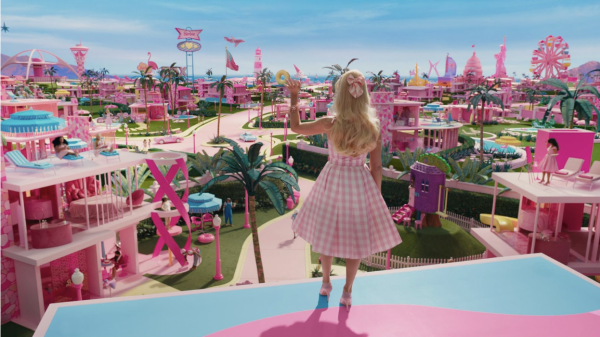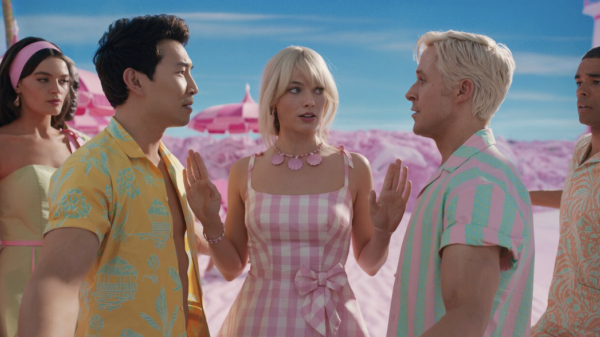“Do you guys ever think about dying?” is not really the kind of question that you would expect Barbie would ask while doing a routine song and dance number with other Barbie and Ken dolls in the idyllic Barbie world. Yet here we are, the Barbie movie has stormed onto the scene and has quickly smashed expectations to become a record-setting 155 million dollar box office success. A movie marketed towards fans of the doll who enjoyed it in their childhood with fond memories of childlike whimsy has now found themselves thrust in the face with Margot Robbie playing the iconic and self-proclaimed “stereotypical” Barbie asking the other Barbie dolls, Kens, and audience around her if they ever think about dying. Subsequently, one of the main points of the film is Barbie questioning the reality around her, and when she is suddenly forced into entering our reality, she is faced with the existential crisis that Barbies have not helped shape the world the way they imagined.
In a cruel twist of fate, we are confronted with the reality of gender equality (or lack thereof) in the US, whereas Barbies were envisioned to help young girls achieve positions of power, careers, and independence. Instead, we are presented with a rather childish expression of the struggles that women face in the film such as worrying about cellulite, bad breath, bad attitude, subjective abnormal behavior, etc.. The Barbie movie, more than anything, needs clarification. It attempts to critique patriarchy and capitalism, but it is honestly quite jarring to see how unaware/unwilling Mattel and the producers of the film were given their positionality. No one is allowed to be the villain in this film as that would require getting at the actual nitty-gritty of the issue here which would be criticizing Mattel as a company itself and how its appeal to a white feminist critique is profit-driven capitalism at the end of the day. White feminism is defined as an expression of feminism perceived as focusing on white women but perceived as failing to address the existence of distinct forms of oppression faced by ethnic minority women and women lacking other privileges.
The film fails to acknowledge that patriarchy in reality is much more complex than it appears. It fails to provide any framework or theory as to what patriarchy even is, it is depicted as having no agency or system, it just is. It fails to acknowledge the role that white supremacy and violence against women have in its operation. In addition, it has a role in toxic masculinity, workplace harassment, gender norms and roles, objectification, sexism, and so on. Yet the film seems to adopt a childish approach to patriarchy. Look at the Kens and Mattel executives for example. They are portrayed as oafish goofs meant to draw sympathy from the viewer so at the end of the day, you can forgive them for being blatantly exploitative of the women in this film. The film is constantly struggling with acknowledging its profit motive and open participation within the patriarchal system while not trying to make itself seem too woke or too morally suspect.
This is just the issue with tackling patriarchy and capitalism from a white feminist and corporate sympathetic perspective. What about Micheal Cera's character, Allen, who is meant to be a queer-coded character depicted as the outlier of the Barbie world. They have their moments but in the end, the movie never establishes their role in the community; they are just a queer-coded character who remains an outcast and outlier, solidifying the male and female binary in the film. What about America Ferrera who is reduced to the role of being the basic girl that is neither pretty nor ugly, has a non-special clerical job, and is barely suggestive of having mental health issues, but those issues get blown over and forgotten in two seconds. Pretty much presented as the"ordinary" Barbie, seems odd that she happens to also be Latine. What about the film's lack of representation? The film has one Barbie girl that is not skinny, just one. There is one Barbie girl in a wheelchair who is used in a dance scene and is never seen again. There is one transgender girl in the film, just one. And there is a girl in the film that everyone calls weird and ugly for not being feminine-presenting and "including" her in the community by making her a… sanitation worker. They clearly were just checking boxes for representation. Even then, there is a lack of 2SLGBTQ+ representation. It's a joke, although there are plenty of product placement ads to enjoy.
Even with all of this, I would still say that I had fun and enjoyed the movie overall. If you watch it purely for entertainment, then you will most likely walk away with no qualms. But if you are keen on the critiques of patriarchy and capitalism, you will quickly sour on any notion that the film will take that extra step to say or do anything meaningful or critical because of Mattel’s complicit participation in the systems that oppress women. Frankly, I wish they hadn't bothered with issues like the gender pay gap, women's representation in positions of power, violence against women, and abortion rights still salient, can we trust these corporate giants to put humane interests first before their very own? Funnily enough, that quote about thinking about dying in a world where racism, poverty, climate change, and the erosion of civil liberties are happening every day is plastered on a t-shirt from a wide variety of online shops and markets on the internet. Who knows? Maybe it can help with dealing with the fact that life isn’t so fantastic that we can’t ignore half-hearted attempts at critiquing the world around us.

